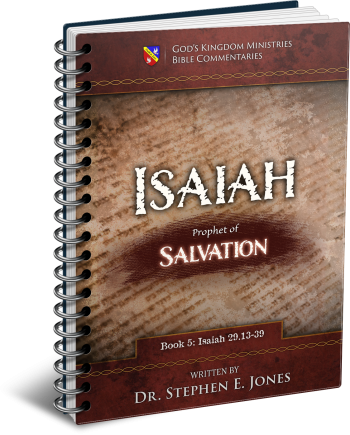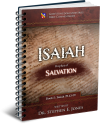Latest Posts
View the latest posts in an easy-to-read list format, with filtering options.

Isaiah is the prophet of Salvation. He is also known as the truly "Universalist" prophet, by which is meant that He makes it clear that salvation is extended equally to all nations and not just to Israel. He lived to see the fall of Israel and the deportation of the Israelites to Assyria, and he prophesied of their "return" to God (through repentance). He is truly a "major prophet" whose prophecies greatly influenced the Apostle Paul in the New Testament.
Category - Bible Commentaries

Isaiah 29:15 says,
15 Woe to those who deeply hide their plans from the Lord, and whose deeds are done in a dark place, and they say, “Who sees us?” or “Who knows us?”
The word “deeply” comes from the Hebrew word amaq, which means “deep, profound, unsearchable.” It is probably what Paul was thinking in Rom. 11:33 when he shouted,
33 Oh, the depth of the riches both of the wisdom and knowledge of God! How unsearchable are His judgments and unfathomable His ways!
But Isaiah applies the idea to those foolish people who think that their own plan can be so deep as to be unsearchable to God, not knowing that all things are laid bare before Him. Heb. 4:12, 13 says,
12 For the word of God is living and active and sharper than any two-edged sword and piercing as far as the division of soul and spirit, of both joints and marrow, and able to judge the thoughts and intentions of the heart. 13 And there is no creature hidden from His sight, but all things are open and laid bare to the eyes of Him with whom we have to do.
The sword of the word is so sharp that it can divide soul (“joints,” or bone) from spirit (“marrow” and “the thoughts and intents of the heart.”) Nothing is hidden from the eyes of God. But the foolish people of Judah in Isaiah’s time thought that they could hide their plans from God. Such are the delusions of the carnal mind.
The prophet’s answer to such foolishness is given in Isaiah 29:16,
16 You turn things around! [“You’ve got it all backward!”] Shall the potter be considered as equal with the clay, that what is made would say to its maker, “He did not make me”; or what is formed say to him who formed it, “He has no understanding”?
When clay pottery thinks it is equal with the potter, it thinks too highly of itself. A potter is always greater than the vessel that he has made. So it is with God and His creation. While God has indeed delegated authority to men, He did not relinquish His sovereignty. Authority is real but it always remains under the higher power that authorized it. This is one of the labor laws built into the universe. We own that which we make by our labor, because, as a US Supreme Court Justice once explained, “labor is our most sacred property right.”
God is the ultimate Creator, who owns all that He has created. Ownership means that He has the inherent right to be served by that which He has created.
But these foolish men of Judah had revolted in an attempt to become gods in their own right. They thought that they could be free of their Creator and even thought that they could hide their plans from Him. Such is the pride and arrogance of the flesh. It is all too common in the earth to this day, for only a few truly recognize the sovereignty of God.
The prophet will revisit the metaphor of the potter and the clay later in Isaiah 45, which sets forth the sovereignty of God. Isaiah 45:8 first sets forth God’s right as the Creator:
8 Drip down, O heavens, from above, and let the clouds pour down righteousness; let the earth open up and salvation bear fruit, and righteousness spring up with it. I, the Lord, have created it.
He then condemns the pottery for arguing with the Potter. Isaiah 45:9 says,
9 Woe to the one who quarrels with his Maker—an earthenware vessel among the vessels of earth! Will the clay say to the potter, “What are you doing?” Or the thing you are making say, “He has no hands”?
A clay vessel has no right to quarrel with his Maker or to determine what sort of vessel the Creator has decided to make. The pottery has no right to accuse his Maker of being handicapped and incompetent. Potters with no hands were rare in those days.
The prophet’s inspired but often misunderstood response is given in Isaiah 45:11 (NASB),
11 Thus says the Lord, the Holy One of Israel, and his Maker: “Ask Me about the things to come concerning My sons, and you shall commit to Me the work of My hands.”
This is not a statement of fact but a question. The NASB translators missed the point of Isaiah’s question. Translated properly, it should be understood, “Are you questioning Me about the things concerning My sons, and do you order Me around concerning the work of My hands?” God is indignant that we would presume to tell Him how to run the universe or how to make vessels or sons.
Isaiah 45:12 then puts clay vessels in their place:
12 It is I who made the earth and created man upon it. I stretched out the heavens with My hands, and I ordained all their host.
God tells man, “I am the Creator, so don’t tell me how to create properly. It is not your will but My will that shall be done!”
Paul echoes the same sentiment in his discussion about vessels of honor and vessels of dishonor. Rom. 9:20, 21 says,
20 On the contrary, who are you, O man, who answers back to God? The thing molded will not say to the molder, “Why did you make me like this,” will it? 21 Or does not the potter have a right over the clay, to make from the same lump one vessel for honorable use and another for common use?
Romans 9 reflects Paul’s knowledge of Isaiah 45 as well as Isaiah 29:15, 16. The metaphor of the potter and clay was well known to apply to the Creator and His creation.
Isaiah 29:17-24 prophesies of the success of the sovereign Creator and His work in the earth. The implication is that God does indeed know what He is doing. He is not handicapped. His wisdom is unsearchable. The Potter will succeed without needing any instruction or advice from the clay. Isaiah 29:17 says,
17 Is it not yet just a little while before Lebanon will be turned into a fertile field [lit., “Carmel”], and the fertile field [“Carmel”] will be considered as a forest?
Lebanon was known for its great cedars, which symbolized royalty. But Lebanon was also a country that worshiped false gods. Isaiah implies that God created Lebanon as well as Israel. Though Lebanon was created as a vessel of dishonor, the day would come when it would become like Mount Carmel—a fruitful, fertile field. Virtually all nations as such were vessels of dishonor at first, but in the end, God will cause them to bring forth the fruit of the Kingdom.
This is the prophet’s opening statement about the plan of our sovereign God. Most men do not understand why God creates vessels of dishonor. It is only when we understand God’s plan to reconcile all of creation that we can truly comprehend the unsearchable wisdom of God. All things will indeed work together for good in the end.
Isaiah 29:18, 19 continues,
18 On that day the deaf will hear words of a book, and out of their gloom and darkness the eyes of the blind will see. 19 The afflicted also will increase their gladness in the Lord, and the needy of mankind will rejoice in the Holy One of Israel.
Just as God has created vessels of dishonor, so also has God created the deaf and the blind as a temporary condition, for we read in Exodus 4:11,
11 The Lord said to him [Moses], “Who has made man’s mouth? Or who makes him mute or deaf, or seeing or blind? Is it not I, the Lord?”
Forty years later, Moses told the Israelites in Deut. 29:4,
4 Yet to this day the Lord has not given you a heart to know, nor eyes to see, nor ears to hear.
This condition has prevailed throughout the earth to the present time, except for the remnant of grace whose eyes and ears have been healed (Rom. 11:7, KJV). The gospels present Jesus as the solution to the problem, for every time He healed the blind and deaf, He prophesied of the day when all will be healed.
Isaiah 29:20, 21 says,
20 For the ruthless will come to an end and the scorner will be finished; indeed, all who are intent on doing evil will be cut off; 21 who cause a person to be indicted by a word [false testimony], and ensnare him who adjudicates at the gate, and defraud the one in the right with meaningless arguments [lies].
These “ruthless” ones who bear false witness and ensnare the judges in order to get an unjust verdict in court are the deaf and blind who will be healed in the end. Their time of blindness and deafness “will come to an end.” God destroys the ruthless by opening their eyes and turning such vessels of dishonor into vessels of honor. He destroys His enemies by reconciling them and turning them into friends.
Isaiah 29:22-24 concludes,
22 Therefore, thus says the Lord, who redeemed Abraham, concerning the house of Jacob; “Jacob shall not now be ashamed, nor shall his face now turn pale; 23 but when he sees his children, the work of My hands, in his midst, they will sanctify My name; indeed, they will sanctify the Holy One of Jacob and will stand in awe of the God of Israel. 24 Those who err in mind will know the truth, and those who criticize will accept instruction.”
This ties the passage back to verses 15 and 16, where men were questioning God’s competency and wisdom concerning the work of His hands. God states emphatically through the prophet that in the end, when the people see the unfolding of His plan for the earth, then “they will sanctify My name.” They “will know the truth” and “will stand in awe,” because they will see that it all worked out for good.
The fact that God created vessels of dishonor seemed at first to be a terrible plan, but this misunderstanding was due to their ignorance of the ultimate reconciliation of all things. Once they understand that God is indeed wise enough to devise a plan where He would win in the end, and that He is sovereign enough to carry out His will and plan for the creation, then they will stand in awe of all that He has done.
Never again will they question His sovereignty or His competence.